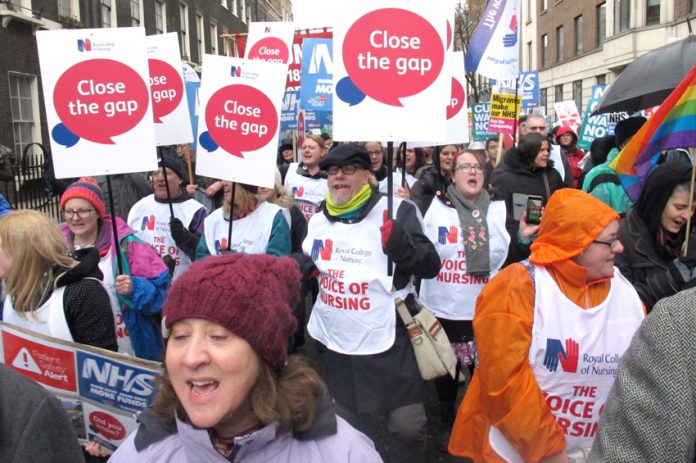TORY government plans to boost the number of trainee nurses in the wake of the Francis report into Mid Staffs are failing, the Royal College of Nursing (RCN) warns on the fifth anniversary of the landmark inquiry.
A further fall in would-be nurses starting training can be expected this September after new UCAS figures today, contained in a report by the RCN, reveal a second decline in applications. The RCN said: ‘Changes to the funding of nurse training – including the removal of the student bursary – were announced in 2015 as a way to increase nurse numbers.
‘Seven hundred fewer students began training last year after the overhaul of nurse education. Today’s report shows the number of applications is continuing to fall this year and, without action to increase numbers, a fall in trainees is expected.’
The government must offer incentives to find tomorrow’s nurses, the RCN’s report says. It comes after separate analysis found the current nursing workforce is shrinking and there are at least 40,000 vacancies in England’s NHS.
The current number of applications for the next academic year has fallen by a third (33%) since the same point in 2016 – 43,720 down to 29,390 and by 4,310 (13%) on last year alone. In addition to the university student shortages, the new nursing apprenticeship attracted only 30 trainees against a government ambition of 1,000 apprentices this year.
Five years after the Francis report into Mid Staffordshire blamed unsafe nurse levels for poor care, Janet Davies, RCN General Secretary and Chief Executive, says the government has ‘squandered’ the opportunity to address the issue.
Similar care failings will become more likely as a consequence, she warns. Ministers must encourage would-be nurse students to apply before the summer in order to boost the numbers joining England’s nursing workforce in 2021. The report, Left to chance, calls for an urgent national campaign organised by the Department of Health and Social Care and Health Education England.
In addition to the urgent campaign, the report calls for:
• A central funding pot to be created within the Department of Health and Social Care (DHSC) to cover means-tested grants and allow for tuition write-off to incentivise students.
• Greater incentives for graduates of other subjects and those already working in the NHS to convert to nursing in post-graduate programmes with financial support.
• The Treasury and DHSC to cover the costs of the apprenticeship model to encourage greater uptake by NHS employers who deliver the course.
• A comprehensive and long-term workforce strategy to be developed by Health Education England with a methodology to determine true population demand on health and care services.
• Safe staffing levels and accountability for planning and provision set in legislation in England and all UK nations.
• Budgets for the continuing professional development (CPD) of the non-medical health care workforce to be reinstated and opportunities clearly communicated.
